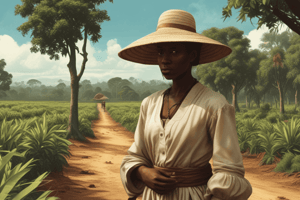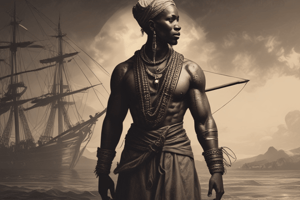Podcast
Questions and Answers
Before 1823, what was allowed to happen to enslaved families?
Before 1823, what was allowed to happen to enslaved families?
- They were given land to settle
- They could be separated and sold at any time (correct)
- They were protected from separation
- They were encouraged to stay together
What was forbidden during western holidays?
What was forbidden during western holidays?
- Blowing horns or beating drums (correct)
- Wearing African clothing
- Singing and dancing
- Eating traditional foods
What was the punishment for teaching an enslaved person to read?
What was the punishment for teaching an enslaved person to read?
- A fine was imposed
- Imprisonment was imposed
- A warning was given
- Severe whipping was inflicted (correct)
What happened to enslaved people caught reading or learning to read?
What happened to enslaved people caught reading or learning to read?
What was prohibited from the enslaved Africans?
What was prohibited from the enslaved Africans?
What was forced upon the enslaved Africans?
What was forced upon the enslaved Africans?
What was one of the ways planters exerted economic control over enslaved Africans?
What was one of the ways planters exerted economic control over enslaved Africans?
What was the purpose of enacting laws that restricted the movement of enslaved people?
What was the purpose of enacting laws that restricted the movement of enslaved people?
What was one of the physical measures used to control enslaved Africans?
What was one of the physical measures used to control enslaved Africans?
Why were relationships between enslaved people from one plantation to another forbidden?
Why were relationships between enslaved people from one plantation to another forbidden?
What was the purpose of enacting curfews?
What was the purpose of enacting curfews?
How did planters exert physical control over enslaved Africans?
How did planters exert physical control over enslaved Africans?
Flashcards are hidden until you start studying
Study Notes
Family Life and Social Control
- Prior to 1823, planters could sell their property and separate families at any time.
- The amelioration measures of 1823 prohibited the separation of families.
- Enslaved Africans were forced to celebrate and practice Western holidays.
- African cultural practices, such as blowing horns or beating drums, were forbidden as a means of communication.
- African Spiritualism and Islam were prohibited, and Africans were forced to adopt European religious practices.
Education and Literacy
- Enslaved Africans were prohibited from all forms of education.
- Reading or learning to read was a punishable crime.
- Anyone caught teaching an enslaved person to read would be whipped severely.
- Enslaved individuals who learned to read suffered severe punishments, including savage beatings and amputation of fingers and toes.
Economic Control
- The economic life of enslaved Africans was controlled, making them dependent on the planter.
- It was illegal for an enslaved person to own property without their master's consent.
- The size of their provision ground was limited to prevent them from becoming self-reliant.
Physical Control
- Physical measures were used to control enslaved people, including placing them in stocks.
- Severe beating, limb removal, and killing were used as punishment.
- Laws restricted the movement of enslaved people, prohibiting them from leaving the plantation without permission.
- Relationships between enslaved people from different plantations were forbidden.
- Curfews were enacted to manage the movement and assembling of enslaved people.
Studying That Suits You
Use AI to generate personalized quizzes and flashcards to suit your learning preferences.




